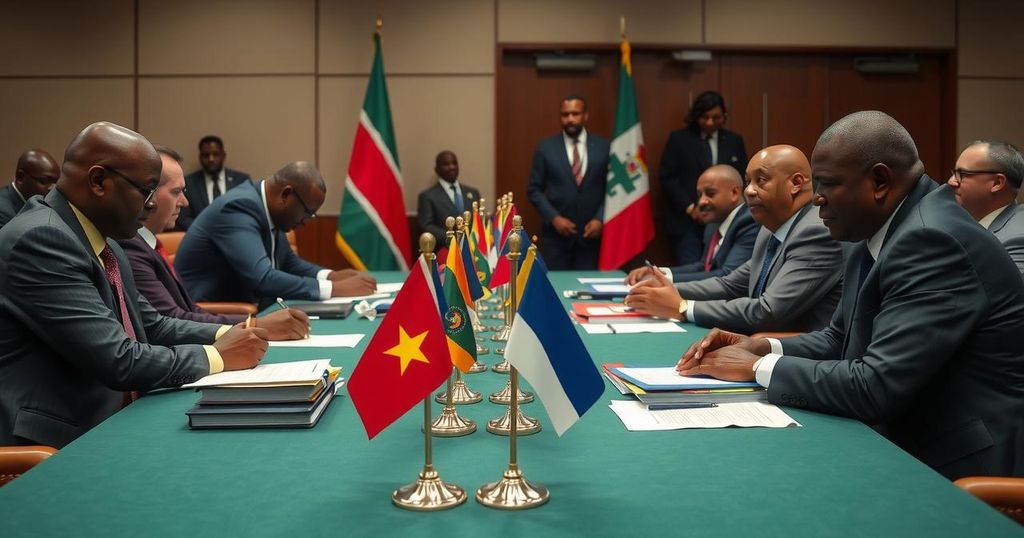Stalled Peace Talks Between the Democratic Republic of Congo and Rwanda: Implications for the M23 Conflict

The Democratic Republic of Congo and Rwanda’s withdrawal from planned peace talks in Angola represents a significant setback in efforts to address the ongoing M23 conflict. Rooted in ethnic tensions since the Rwandan Genocide, the conflict has led to severe humanitarian consequences. Allegations of Rwanda supporting the M23 complicate negotiations, necessitating renewed dialogue and international mediation to achieve lasting peace.
On December 15th, it was revealed that the Democratic Republic of Congo (DRC) and Rwanda had withdrawn from scheduled peace talks in Angola, intended to address the ongoing conflict with the M23 rebel group. This setback highlights the escalating tensions as both sides struggle to find common ground amidst a complex history rooted in ethnic discord. The M23 movement, which emerged in 2012 from Tutsi soldiers, has contributed to significant human rights violations and a humanitarian crisis in the eastern Congo. Rwanda’s involvement is complicated by its historical concerns regarding Hutu rebel groups that threaten its national security. Meanwhile, peace negotiations are hindered by Congo’s mistrust of Rwanda, compounded by allegations of Rwandan support for the M23. Congolese officials and international bodies, including the United Nations and the African Union, have emphasized the urgent need for constructive dialogue to avoid further violence and humanitarian degradation.
The conflict in the eastern region of the Congo is deeply intertwined with its post-genocide history, where ethnic tensions have persisted since the 1994 Rwandan Genocide. The DRC and M23 conflict is exacerbated by prolonged instability affecting millions of civilians deprived of basic services. Attempts by Rwanda to mediate between Congo and M23 have been met with skepticism, leading to heightened suspicions. Furthermore, Rwandan demands for direct dialogue with M23 as a precondition for peace talks are seen as reluctant interference in Congolese affairs. As fighting continues, the humanitarian situation worsens, complicating the prospects for resolution. Hence, a peace process that accommodates the concerns of both parties is paramount, underpinned by international mediation and oversight.
In a statement made to Voanews, Congolese spokesman Giscard Kusema noted, “Rwandans have set a precondition for the signing of an agreement that the Congo hold a direct dialogue with the M23.” Such demands reflect not only Rwanda’s apprehensions but also Congo’s historical grievances rooted in the region’s violent past. This climate of distrust necessitates a redoubling of efforts for peace, where all stakeholders engage in confidence-building measures.
The failure to engage in peace negotiations signals a missed chance to resolve the persistent crisis affecting the Congo and broader Central Africa. The absence of dialogue only fuels the ongoing conflict, with ramifications that hinder stability and human welfare. A shift toward genuine collaboration and respect for each nation’s sovereignty is essential. A holistic approach that addresses the concerns of ethnic identities and incorporates international facilitators may aid in brokering a meaningful dialogue, ultimately leading towards a sustainable solution to the conflict.
The Democratic Republic of Congo and Rwanda are embroiled in an ongoing conflict revolving around the M23 rebel group, which has significantly impacted regional stability through violence and human rights abuses. The M23, formed by defected soldiers, is rooted in the complex ethnic dynamics between the Tutsi and Hutu communities, exacerbated by the repercussions of the 1994 Rwandan Genocide. Rwanda’s interest in the conflict is informed by fears of security threats from Hutu groups in the eastern Congo. The failure of peace talks reflects a deeper mistrust and the urgent need for mediation and resolution strategies to address both humanitarian crises and the broader implications for regional security.
The withdrawal of both the DRC and Rwanda from peace talks represents a substantial obstacle to addressing the ongoing M23 conflict, further exacerbating the humanitarian crisis in the region. The resolution of this conflict necessitates renewed commitment from both nations to understand each other’s concerns and engage in direct negotiations. Additionally, the involvement of international bodies is crucial to facilitate dialogue and foster an atmosphere of trust. Only through constructive communication and a commitment to peace can there be hope for stability and humanitarian relief in the Congo.
Original Source: theowp.org








